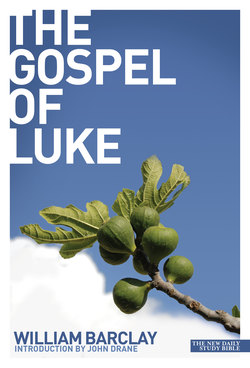Читать книгу Gospel of Luke - William Barclay - Страница 40
На сайте Литреса книга снята с продажи.
ОглавлениеTHE OPPOSITION INTENSIFIES
Luke 5:16–17
Jesus withdrew into the desert places and he continued in prayer. On a certain day he was teaching and, sitting listening, there were Pharisees and experts in the law who had come from every village in Galilee and from Judaea and Jerusalem. And the power of the Lord was there to enable him to heal.
THERE are only two verses here; but as we read them we must pause, for this indeed is a milestone. The scribes and the Pharisees had arrived on the scene. The opposition which would never be satisfied until it had killed Jesus had emerged into the open.
If we are to understand what happened to Jesus we must understand something about the law, and the relationship of the scribes and the Pharisees to it. When the Jews returned from Babylon about 440 BC they knew well that, humanly speaking, their hopes of national greatness were gone. They therefore deliberately decided that they would find their greatness in being a people of the law. They would bend all their energies to knowing and keeping God’s law.
The basis of the law was the Ten Commandments. These commandments are principles for life. They are not rules and regulations; they do not legislate for each event and for every circumstance. For a certain section of the Jews that was not enough. They desired not great principles but a rule to cover every conceivable situation. From the Ten Commandments they proceeded to develop and elaborate these rules.
Let us take an example. The commandment says, ‘Remember the sabbath day and keep it holy’; and then goes on to lay it down that on the Sabbath no work must be done (Exodus 20:8–11). But the Jews asked, ‘What is work?’ and went on to define it under thirty-nine different headings which they called ‘Fathers of Work’. Even that was not enough. Each of these headings was greatly subdivided. Thousands of rules and regulations began to emerge. These were called the oral law, and they began to be set even above the Ten Commandments.
Again, let us take an actual example. One of the works forbidden on the Sabbath was carrying a burden. Jeremiah 17:21–4 says, ‘For the sake of your lives, take care that you do not bear a burden on the sabbath day.’ But, the legalists insisted, a burden must be defined. So definition was given. A burden is ‘food equal in weight to a dried fig, enough wine for mixing in a goblet, milk enough for one swallow, oil enough to anoint a small member, water enough to moisten an eye-salve, paper enough to write a customhouse notice upon, ink enough to write two letters of the alphabet, reed enough to make a pen’ . . . and so on endlessly. So for a tailor to leave a pin or needle in his robe on the Sabbath was to break the law and to sin; to pick up a stone big enough to fling at a bird on the Sabbath was to sin. Goodness became identified with these endless rules and regulations.
Let us take another example. To heal on the Sabbath was to work. It was laid down that only if life was in actual danger could healing be done; and then steps could be taken only to keep the sufferer from getting worse, not to improve their condition. A plain bandage could be put on a wound, but not any ointment; plain wadding could be put into a sore ear, but not medicated. It is easy to see that there could be no limit to this.
The scribes were the experts in the law who knew all these rules and regulations, and who deduced them from the law. The name Pharisee means ‘the separated one’; and the Pharisees were those who had separated themselves from ordinary people and ordinary life in order to keep these rules and regulations.
Note two things. First, for the scribes and Pharisees these rules were a matter of life and death; to break one of them was deadly sin. Second, only people desperately in earnest would ever have tried to keep them, for they must have made life supremely uncomfortable. It was only the best people who would even make the attempt.
Jesus had no use for rules and regulations like that. For him, the cry of human need superseded all such things. But to the scribes and Pharisees he was a law-breaker, a bad man who broke the law and taught others to do the same. That is why they set themselves against him and in the end brought about his death. The tragedy of the life of Jesus was that those who were most in earnest about their religion drove him to the cross. It was the irony of things that the best people of the day in the end were responsible for his crucifixion.
From this time on there was to be no rest for him. Always he was to be under the scrutiny of hostile and critical eyes. The opposition had crystallized and there was but one end.
